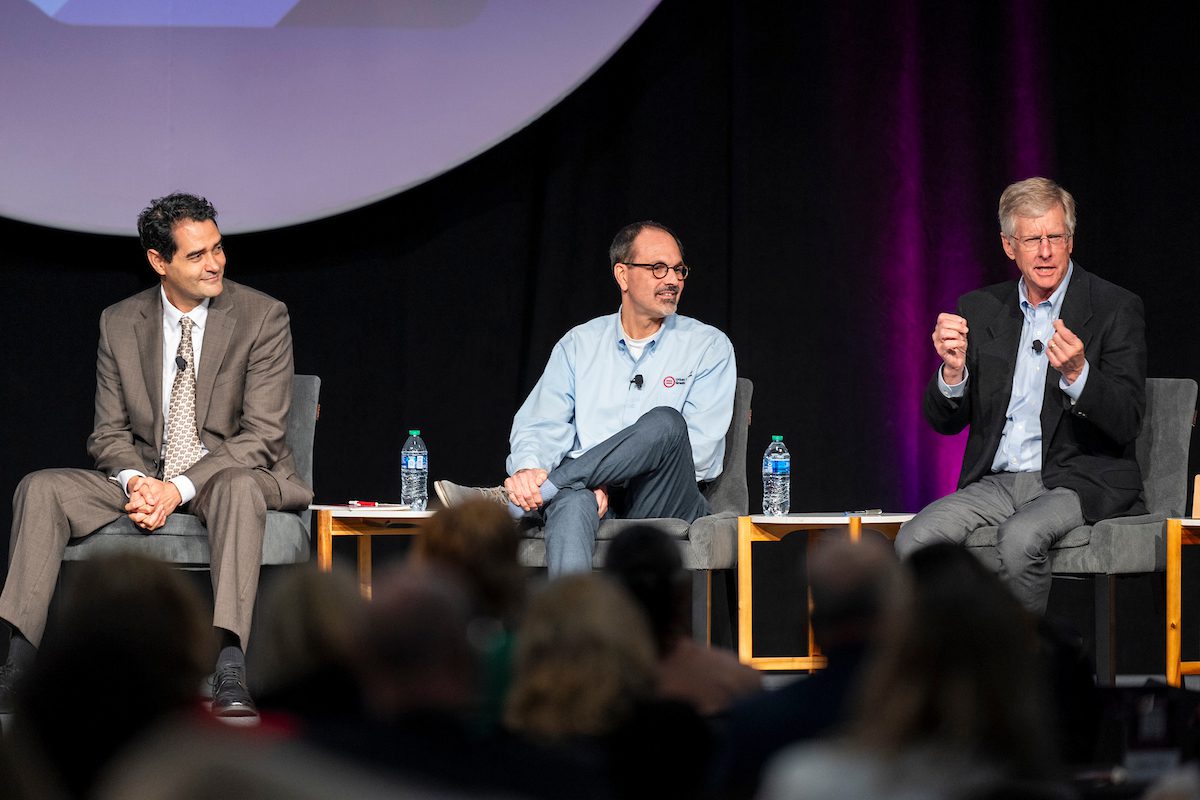Bill Harrigan invests in people and sells trust.
This is how Harrigan characterizes his work as founder and CEO of Harrigan Solutions, a Grafton firm that assembles teams of workers—including formerly incarcerated people and refugees—in trustworthy teams to provide sanitation in food plants, preventative maintenance on production equipment, and work at construction sites.

Peter Moreno, Director, Odyssey Beyond Bars, UW Odyssey Project, Edward Lee, EVP & COO, Urban League of Greater Madison, and Bill Harrigan, Founder & CEO, Harrigan Solutions, share insights about the workforce during the Summit session ‘Opportunities for Formerly Justice-Involved People.’ Wisconsin Economic Summit WEDC Oct. 23, 2023. (Photo © Andy Manis)
While some employers may discard applications from former inmates, Harrigan sees them as a resource able to succeed and thrive.
“We believe that everybody wants to succeed,” Harrigan told 400 people gathered for WEDC’s Wisconsin Economic Summit in Appleton on Oct. 23. “What we’re about is recognizing that they’re dying to contribute, and we create a system where they’re able to do that.”
In a competitive labor market, formerly incarcerated people are an often-overlooked resource.
Peter Moreno, director of Odyssey Beyond Bars, a part of the Odyssey Project at the University of Wisconsin-Madison, is helping prepare inmates for life after prison. Part of the work involves helping them work through the trauma of imprisonment.
“Many come from a long line of multigenerational poverty and they’re trying to break that, which comes with its own trauma,” Moreno said. “We’re working with those students to develop those skills and get them ready for more learning from our program.”
Moreno said that Wisconsin has 21,000 people in prison, most of whom will be released someday. Research shows that there’s no reason to fear these people, he added. “There isn’t any research out there that is showing that a formerly incarcerated person is any greater risk than someone with no incarceration experience in your workplace,” Moreno said.
Edward Lee, executive vice president and chief operating officer at the Urban League of Greater Madison, operates a free legal clinic that helps people break down barriers to employment, housing, and other resources due to past criminal records. It also helps people expunge their criminal records.
Lee said it is like “having a burden lifted off of people’s shoulders when they get that expunged off of that record. It feels like they’re getting that second chance.”
“What we ended up doing,” he added, “is really layering that into that job training work.” One of Lee’s clients was able to get her criminal record expunged and go on to get her GED and training as a certified nursing assistant. From there, she landed a job at Agrace in Madison and intends to get a four-year nursing degree.
Moreno shared a success story about a student nearing release after a 40-year sentence for murder who earned a bachelor’s degree, is enrolled in a Ph.D. program, and intends to mentor imprisoned and formerly incarcerated people.
Lee urged employers to reach out to programs working with formerly incarcerated people. “What we see is that when our employer partners get in a class or get in a room with folks, those stereotypes melt away. When you get to know the person, you’re willing to take those chances, open those doors, create those opportunities,” he said.
Harrigan also offered employers this advice: “Help them identify what they’re great at. Ask them for help, and do it consistently. Build deliberate practices for your supervisors to consistently ask your people for help in solving problems.”
